Shop Smarter: Ultimate Guide for Istanbul Supermarkets and Grocery Stores
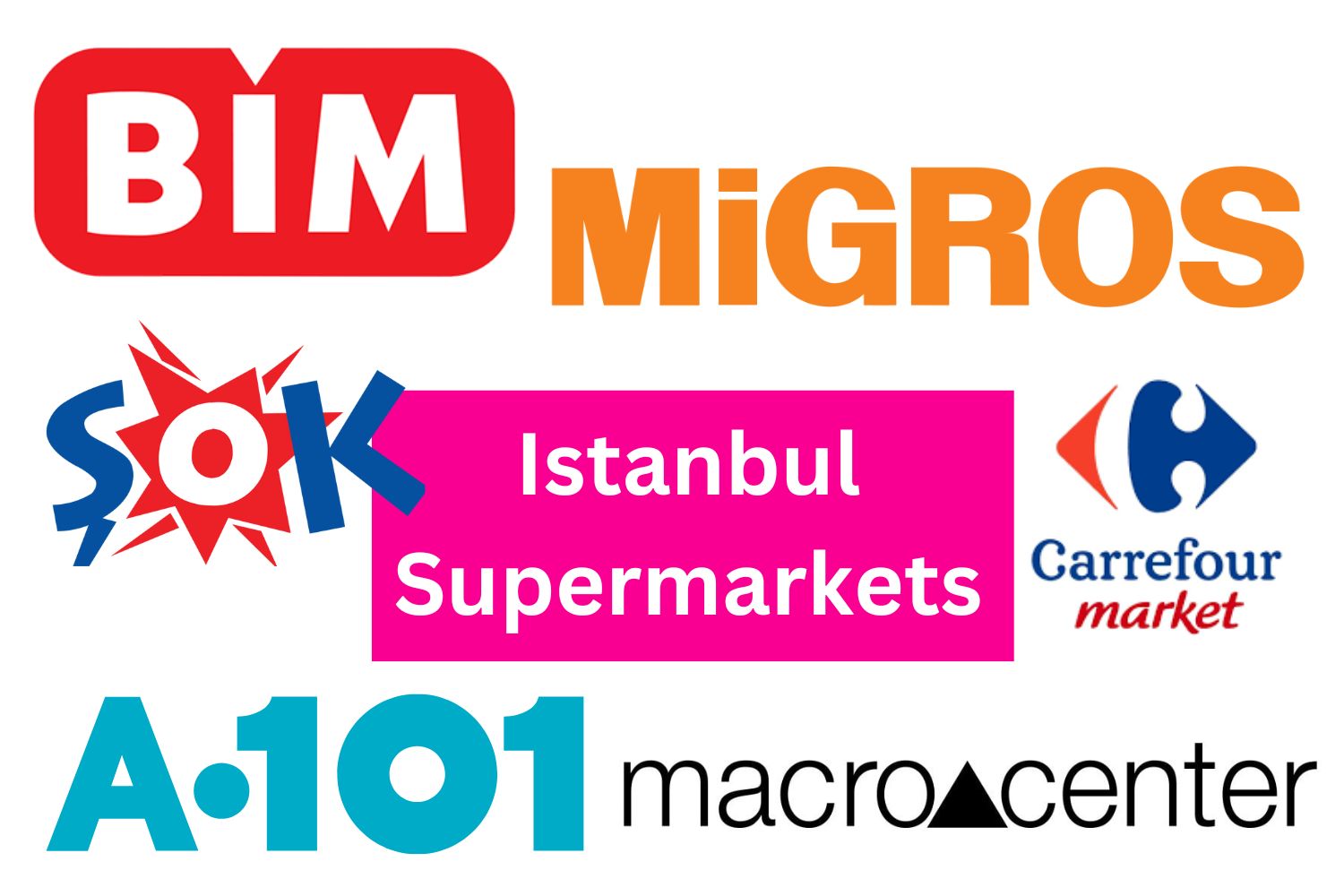
The Art of Living in Turkey contains affiliate links and is a member of the Amazon Services LLC Associates Program. If you make a purchase using one of these Amazon links, I may receive compensation at no extra cost to you. See my Disclaimers for more information.
Istanbul’s supermarkets are a treasure trove of variety and value, offering everything from budget-friendly essentials at BIM, A101, and Şok to upscale finds at Migros, Carrefour, and MacroCenter.
Beyond these chain stores, the city’s specialty markets, ethnic grocery shops, and vibrant Turkish bazaars add a layer of cultural richness with fresh, seasonal produce and local delicacies.
One of my favorite ways to explore a new destination is by wandering through its grocery stores. There’s something fascinating about seeing what fills the shelves and comparing it to the stores I know back home.
I love discovering unique spices, snacks, or candies—small souvenirs that bring a taste of my travels back to my kitchen.
Since moving to Turkey in 2007, the once-unfamiliar aisles of Turkish supermarkets have become a familiar and integral part of my life. Grocery shopping in Istanbul has a rhythm all its own.
Whether it’s a quick stop at the local market or a leisurely stroll through the neighborhood bazaar, I’ve learned where to find the best deals, unique items, and local favorites.
In Istanbul, the sheer convenience of having a grocery store on nearly every block is striking, especially when compared to the sprawling, car-centric suburbs of the United States. Here, shopping is not just about necessity—it’s an experience that reveals the heart of Turkish culture.
Curious about where to shop and what to look for? Whether you’re a visitor eager to explore Istanbul’s culinary landscape or a new resident settling into the city, I’m here to share my insights.
From navigating chain supermarkets to savoring the charm of traditional bazaars, let me guide you through the vibrant world of Turkish grocery shopping. Grab your shopping bag—it’s time to dive in!
Understanding the world of groceries in Istanbul
Turkey’s culture of the weekly “pazar” (farmer’s market) holds a central place in community life.
Traditionally, the bazaar, or pazar in Turkish, would be where you bring your vegetables, cheese, or eggs to sell, and where folks from surrounding villages would come to shop and catch up.
This pazar culture still lives on, even in a major metropolis like Istanbul.
Each neighborhood in Istanbul offers a weekly pazar on a different day of the week (ask around to find out where and when), and that’s where you can find the freshest vegetables and fruit in season.
You can also find everything from cheap brand-named clothing overstock to jewelry to Tupperware to curtains at a pazar. One-stop shopping at its best!
However, a once-a-week market is not enough to satisfy the shopping needs of busy Istanbulites with their 60-hour-a-week jobs.
Every neighborhood also has bigger locally owned grocery markets (like Mopas or Happy Center) where you can find the butcher, the baker, the detergent seller, and the veggie guy under one roof.
In the 1990s discount grocery chains like BIM (designed to be like the German discount store Aldi) and larger international chains like Migros and Carrefour started making a splash in the Turkish market.
These markets are all over Turkey and come in all sizes–extra small hole-in-the-wall stores to gigantic mega stores selling everything from washing machines to toothpicks to lettuce.
Since the pandemic, online grocery delivery has also taken off in Istanbul.
Every major supermarket chain has its own app, and there are alternatives like Getir and Yemeksepeti Market that will bring you anything you want at almost any time of day and night.
There are also online ethnic grocery stores in Istanbul, to source specialty items from countries around the world.
All these layers of shopping come together to make a shopper’s paradise.
Supermarkets, traditional markets, and online shopping coexist in a happy amalgam of modern efficiency coupled with traditional charm.
The Best 5 Supermarkets in Istanbul
When it comes to navigating the grocery store scene in Istanbul, the choices are as varied as the city itself.
Each chain has carved out its niche, catering to different needs, tastes, and budgets and they can be found throughout Turkey.
From budget-friendly options that make every lira stretch a little further to premium stores where upscale items line the shelves, Istanbul’s supermarkets offer something for everyone.
Let’s dive into the specifics of what makes each major chain stand out in this diverse market.
1. BIM: Budget-Friendly Shopping
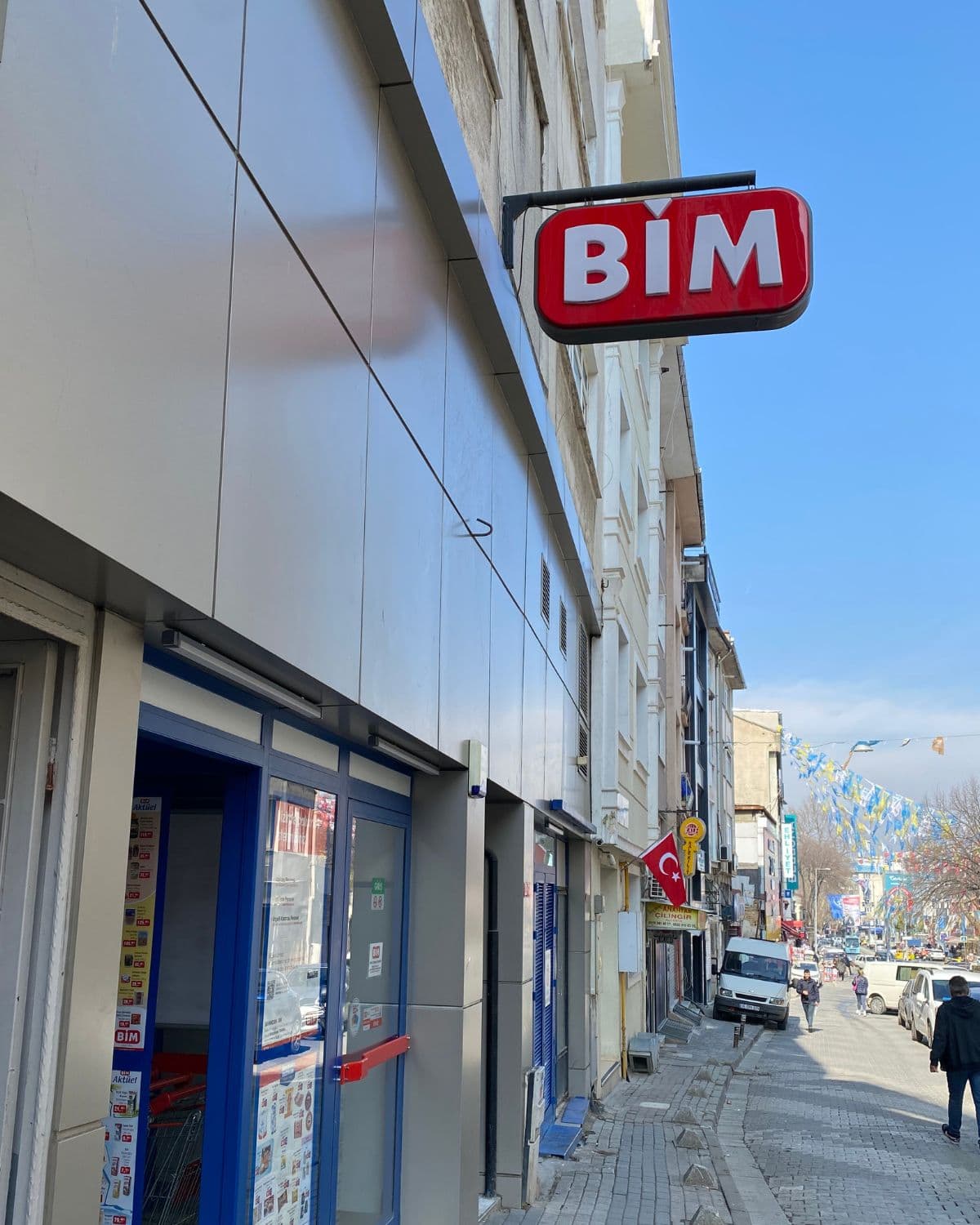
With its red and white signs beckoning from nearly every corner, BIM is a household name known for known for providing high-quality goods at reasonable prices and a straightforward shopping experience.
It carries daily staples at a bargain price, modeled after the German grocery chain Aldi.
I probably do the majority of my household shopping here. My favorite things to get are the stringy cheese and the nuts (especially pistachios).
I love that I don’t have to compare prices between items since there tends to just be one option for that item (like mayonnaise or cocoa powder), and I know that it’s the best price in the neighborhood.
They also have their own brand of SIM cards and you can refill your Istanbulkart (public transportation card) there as well.
2. A101: Where Value Meets Variety
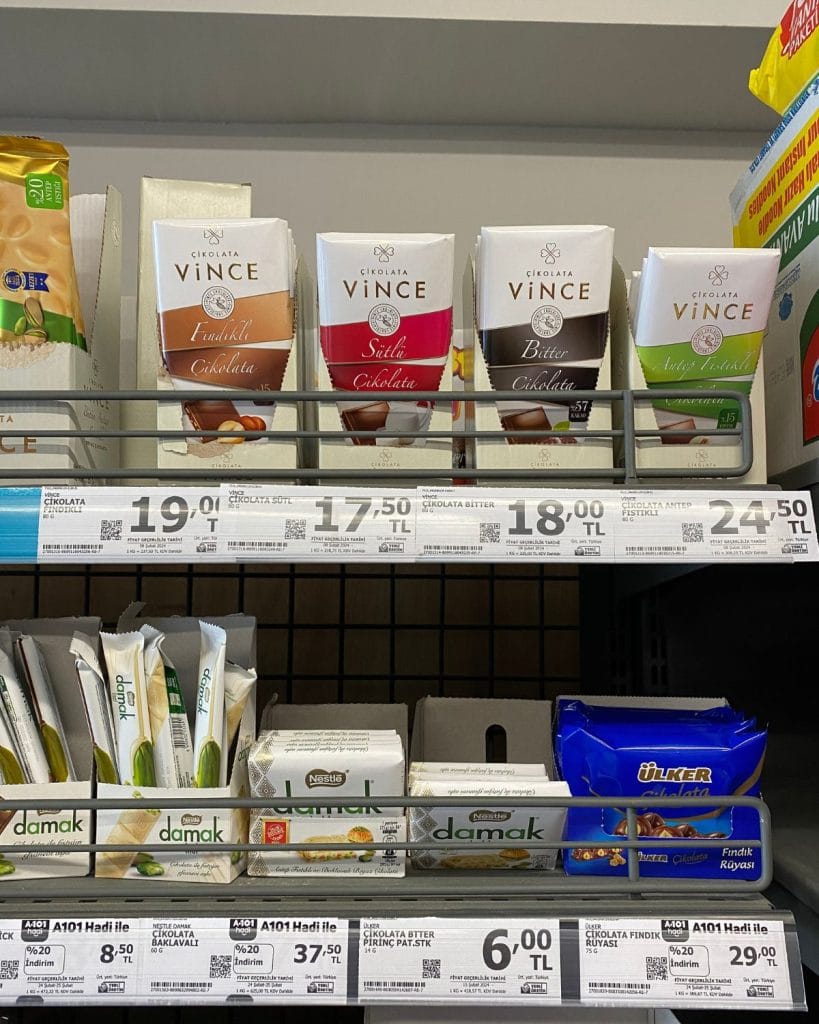
A101 takes the concept of value shopping a step further by offering a wider variety of products without compromising on price.
They have some store-brand options next to a variety of name-brand options for many products.
The teal branding is hard to miss, and their tagline is “Harca harca bitmez,” which means “Spend, spend, it doesn’t end.” Love that!
The specific things I get at A101 are wet wipes (I like their smell) and Vince dark chocolate. In Turkey, dark chocolate is called “Bitter.”
Vince, my favorite chocolate brand in Turkey, is the A101’s store brand, and it is both economical and delicious!
3. Sok: Convenient Locations, Competitive Prices
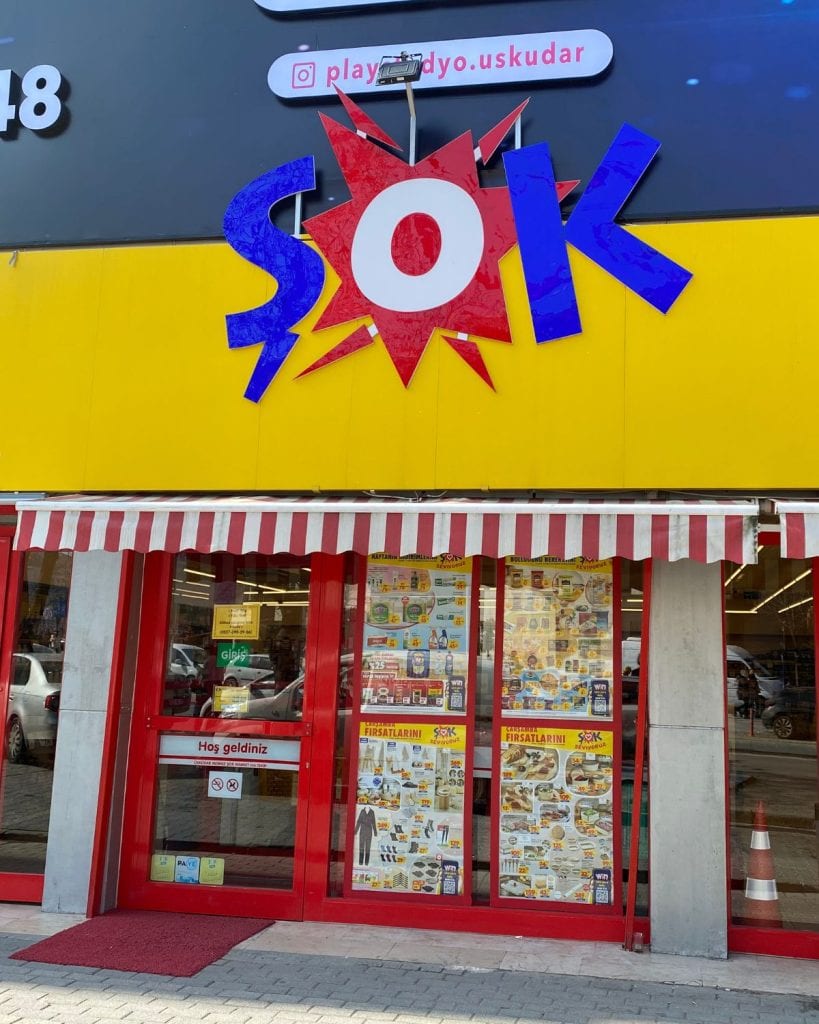
Şok (pronounced “Shock”) is another key player in the budget arena.
The Sok market is the budget brand of the Migros family of stores, and its red and yellow storefronts are easily recognizable.
Şok tends to have a slightly wider array of fresh fruit and vegetables than BIM or A101, and their store brand (“Mis” brand) dairy products are really good quality.
I will go out of my way to get Mis yogurt and heavy cream, it’s that good.
4. from Migros Jet to the biggest grocery store in Istanbul
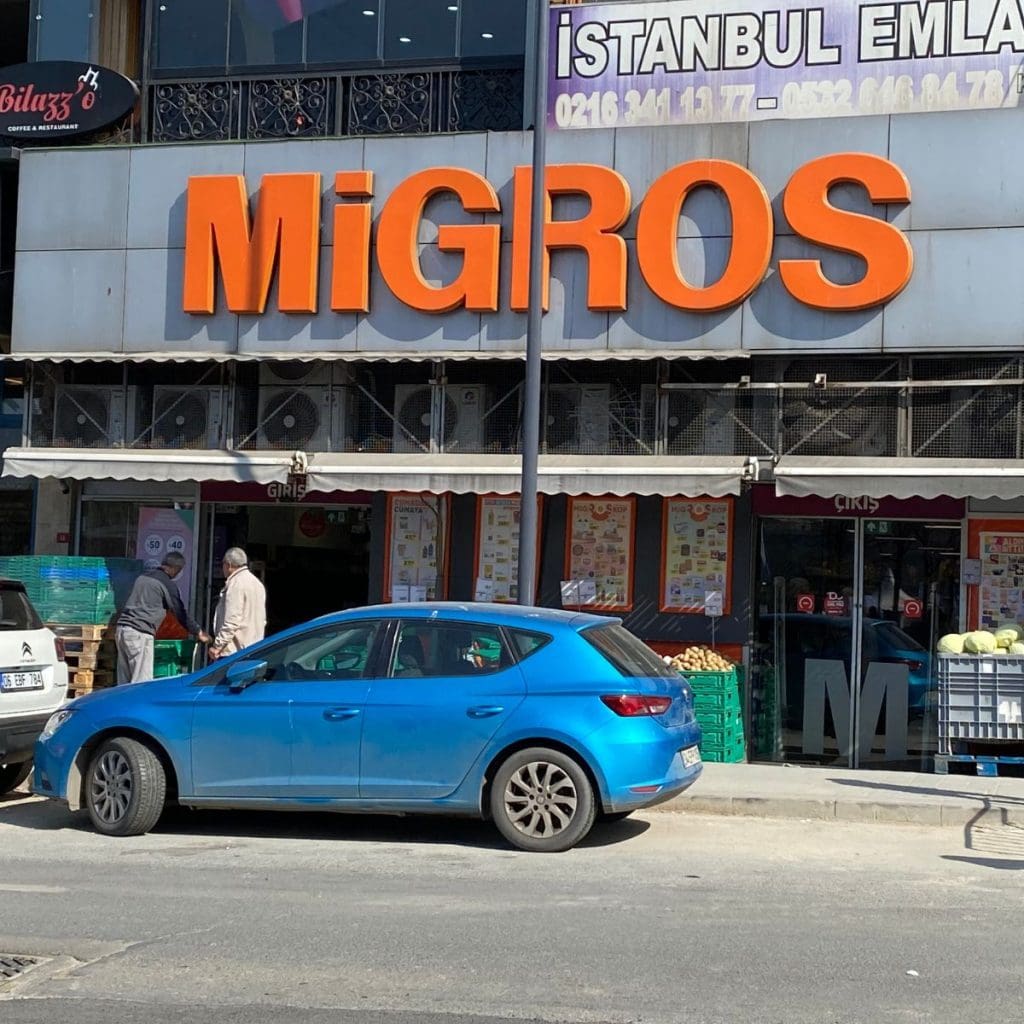
Stepping into a Migros supermarket can feel like entering a different world, especially if you’re coming from the more budget-centric stores.
The Migros brand first appeared in Istanbul in 1954, is originally from Switzerland, and is one of the oldest and largest in Turkey.
It prides itself on offering a diverse product range that includes not just local and imported items but a fantastic selection of organic, gluten-free, and gourmet foods.
Migros stores range in size from small “Jet” convenience-type stores to gigantic “5M” stores that are like little shopping malls in and of themselves.
The more “M’s” a Migros has, the bigger it is.
The biggest stores are in neighborhoods far from the center of the city since they are so big and need a lot of land.
On the Asian side, there is one in the Viaport Mall near Sabiha Gokcen airport, and on the European side, there is one (among other places) at Star City Outlet Mall in Bahcelievler.
These are the Turkish supermarket giants, selling normal grocery products as well as clothes and appliances.
I go to my neighborhood Migros to pick up items like almond milk, cheddar cheese, and brown rice.
These are specialty items that Migros always carries but are rarely in my neighborhood budget shops.
5. Carrefour: big supermarkets in Istanbul
Carrefour is a French chain that has made inroads in the grocery business in Turkey.
Similar to Migros, there are various types of this market: Mini (small), Supermarket (medium-sized), Hypermarket (like 5M Migros), and Gurme (Gourmet).
It carries an extensive range of international brands, from American breakfast cereals to Italian pasta to Asian sauces.
Their store-brand dairy is particularly delicious–try their kaşar cheese (like a plain mozzarella). Great for grilled cheese or shredding on any meal!
Bouns: MacroCenter, a Premium Shopping Experience
For those who prefer their grocery shopping to be an experience rather than a chore, MacroCenter offers a premium space where they stock high-end and imported goods, gourmet foods, and a vast selection of wines and spirits.
MacroCenter is the upper end of Migros’s family of grocery stores. You can find daily staples alongside lots of international imports and specialty fruits and vegetables.
I make occasional trips to MacroCenter to pick up plain tortilla chips, Thai sweet chili sauce, or fun fruit like pomelo or blueberries.
They also decorate nicely for the holidays and have traditional Christmas-y things like tins of Danish butter cookies or Santa-decorated chocolates.
Our family once spent a fun afternoon in a MacroCenter in Antalya, just exploring the aisles and picking up treats and high-quality food to enjoy.
Nothing says vacation like fun groceries!
Exploring Specialty and ethnic grocery stores in Istanbul
While major chains offer convenient options and a wide range of products, Istanbul’s specialty stores and ethnic-specific grocery shops add layers of flavor and culture to the city’s shopping experience.
These niche markets are treasure troves for foodies and for foreigners like me who have made this city home.
Discovering Local Delicacies
Back in the day, if you wanted meat you went to the butcher; if you wanted honey you went to the honey shop; if you wanted olives and cheese you went to the specialty shop for those items.
These days Istanbul’s specialty stores still guard that culinary tradition.
These specialty shops are sprinkled around each neighborhood but are also concentrated in various shopping areas around the city.
The Uskudar fish market, Besiktas fish market, and Kadikoy market area are all great places (among many) to find fresh fish and meat, regional cheeses, olives and olive oil, fresh nuts, and sweet treats.
Korean and Chinese groceries
In a city that straddles two continents, the presence of East Asian markets adds some international flair to Istanbul’s shopping scene.
As a Korean-American, I find myself craving bulgogi or kimchi and need special ingredients like toasted sesame oil or fish sauce to make these tastes of home.
Smart Market in Kemerburgaz and Koremaru in Umraniye are my go-to markets for Korean and Chinese staples like sesame oil and black bean sauce. These are both small establishments (nothing like H-mart back in the US) but they have what I need for my special meals.
Gurme (gourmet) Net is a website that has lots of hard-to-find groceries, including East Asian options! I’ve had good experiences ordering from here and recommend it.
Pakistani delight
There is a small but significant Pakistani community in Istanbul, according to my good friend Sidra.
Although she generally brings her spices and treats back with her when she travels, she tipped me off to a few places where she can find Pakistani products locally.
Pakistani Grocery Shop in Fatih has spices and dry goods, but also traditional clothing options for sale. If you’re far from Fatih, Amy’s Istanbul is a great option for online Pakistani grocery shopping.
Syrian specialties
Turkish cuisine, originating from the Central Asian steppes, does not normally include hummus or felafel.
It has been wonderful to see more restaurants around Istanbul opened by Syrians and other immigrants from the Middle East, who have brought their food culture with them.
I love having easy access to delicious felafel wraps!
There is a concentration of Syrian restaurants and grocery companies in Fatih, especially around Malta Carsisi Street.
Al-Radwan Market is one of many places you can go to purchase Syrian snacks, spices, and delicious flatbread (so good with hummus).
Italian imports
While Macrocenter and Carrefour Gurme might carry a few upscale Italian specialties, the mother of all Italian grocery stores is Eataly in the Zorlu Center Mall.
Eataly is not just a store; it’s an experience.
A combination of different restaurants (each with a different focus, like gelato or pasta or more upper-end Italian cuisine) and a grocery store, this is a great place to go for Italian wine, sauces, and pork products as well.
Eataly also hosts cooking workshops, if you’d like to learn to make various Italian specialties. Buon appetito!
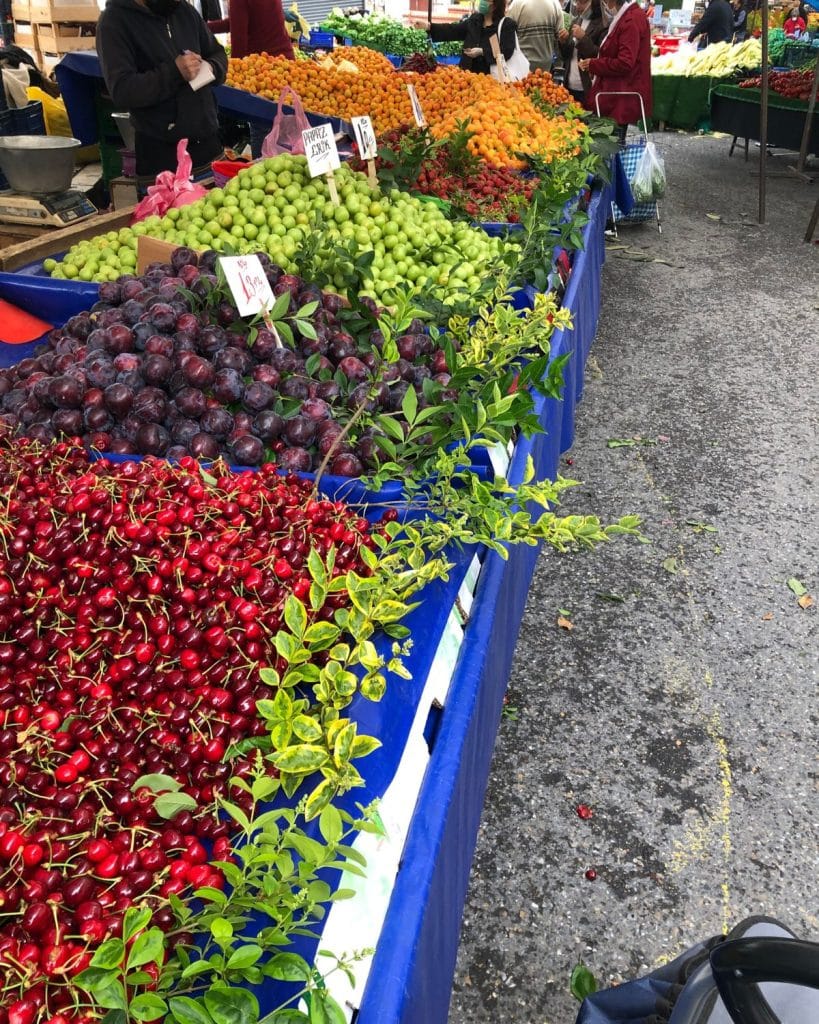
The Charm of Turkish Pazars
Since I first moved here in 2007, I have loved the Turkish weekly bazaars, or pazar in Turkish.
There’s something amazing about walking past the piles of fresh fruit and vegetables, each vendor yelling out “buyurun, buyurun” to draw attention to their wares.
For the last few years, my apartment building has been situated in an area that turns into a weekly pazar on Fridays.
Every Thursday night I need to make sure my car is parked outside the bazaar area, and every Friday we wake up to the sounds of the vendors setting up their stands.
Turkey is a huge agricultural producer and exports its fruit and veg to many countries in the area.
The freshness and seasonality of fruits and vegetables here are amazing and add a sense of anticipation to each pazar visit.
I love getting juicy oranges and cruciferous vegetables like broccoli and cabbage in the winter; seeing the coming of spring when strawberries and artichokes come to the bazaar; reveling in fresh cherries and peaches in the summer; and biting into a crisp apple when fall comes around.
Seasonality also means I might not be able to make favorite recipes during the off-season, but learning to live with not having strawberry shortcake in November helps me to feel more connected to the earth and its rhythms.
The pazar is also a great place to get bargain household and clothing items. Clothing vendors often sell overstocked clothing items from famous European brands like Zara and Mango.
I’m good friends with my local Tupperware pazar lady, and my daughters like to browse the pazar for jewelry or gifts.
Interestingly, the culture of weekly pazars is not just limited to Turkey.
When I visited Montenegro in the Balkans, I noticed that they had a pazar that was incredibly similar to what I see in my neighborhood each week.
They are everywhere from Albania to Thailand and beyond!
It would be interesting to learn about the history of pazar culture in the region! Can anyone recommend a book or podcast about this?
Shopping Strategies for Istanbul Supermarkets and Pazars
Navigating the bustling markets and supermarkets of Istanbul is an art in itself.
Whether you’re weaving through the crowded aisles of neighborhood bazaars or scanning the shelves of a local market, knowing a few key strategies can transform your shopping experience from overwhelming to enjoyable.
Below are some insider tips to help you shop like a local, make the most of your lira, and even enjoy the process.
Best Times to Shop
To avoid long lines and ensure you get the freshest produce, timing is everything. In supermarkets, the early morning hours are golden.
You avoid commuters grabbing some dinner items before heading home, and get the first pick of the day’s fresh produce and bakery items.
For pazars, it’s a good idea to go after 10 a.m. to ensure that the stands are totally set up.
But you also want to avoid the later afternoon hours (around 4 or 5 p.m.) when the market can get packed.
The one perk of visiting the pazar at the end of the day is that vendors are more likely to offer discounts to clear out remaining stock, making it the perfect time for bargain hunters.
Local must-try items
If you’re a first-time visitor or a new resident here in Turkey, it can be easy to keep your grocery list to things that are familiar to you.
Cereal for breakfast, smoked turkey sandwiches for lunch, and meatloaf for dinner are all meals that are easily sourced from a local grocery store here.
But part of the joy of living in a new place is eating as the locals do.
For breakfast, you’ll see lots of items in every grocery store that would cover a local Turk’s table for the all-important morning meal.
Delicious green and black olives, jars of olive paste, different types of hard and soft cheese, fresh bread, and loose black tea are all staples that are worth trying.
Turks love to use spices like mint, cumin, and red pepper flakes to flavor soups and stews.
These spices are ubiquitous and generally very fresh and can add a pop of flavor to an otherwise boring meal.
In some bigger stores like Migros or Carrefour, you can source spices like sumak (with a tangy flavor) or urfa pepper (called “isot” here, not-too-spicy pepper flakes with a smoky salty flavor profile) for a delicious experience.
If you’ve ever read or watched The Lion, The Witch and the Wardrobe, you’ll have heard of a candy called Turkish delight, or lokum as it’s called here.
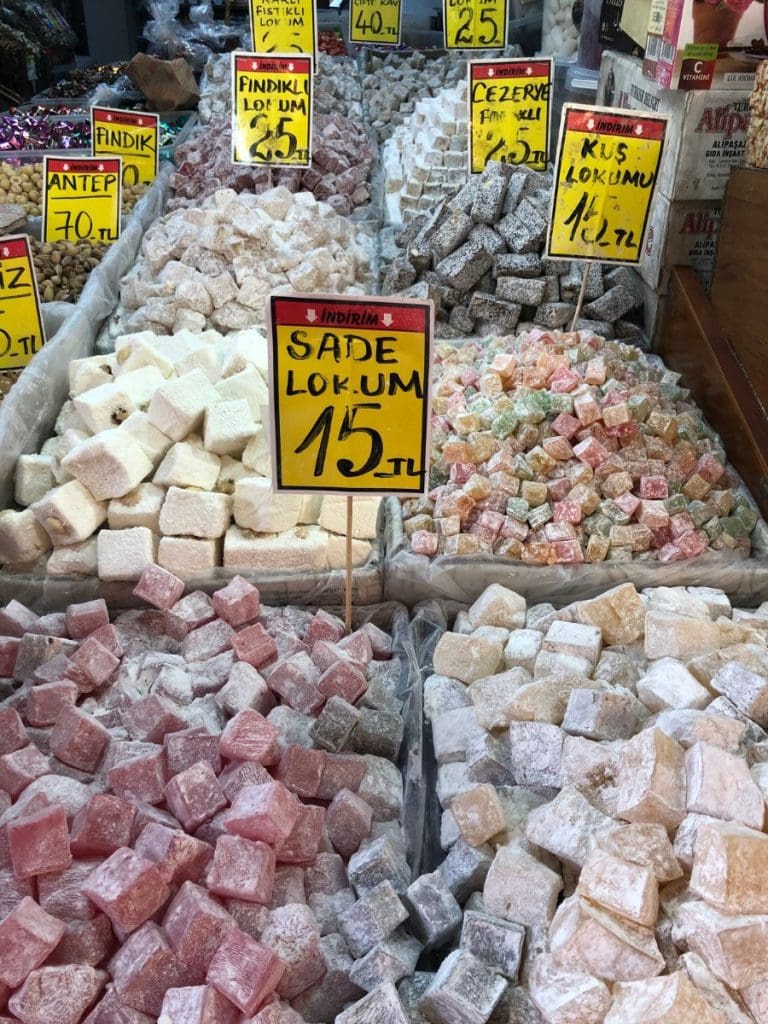
Lokum is a real thing that is loved by locals! It’s a chewy, sticky sweet that’s cut into cubes and covered in powdered sugar.
My favorite is the pomegranate-flavored double pistachio kind. Koska is a good brand and can be found in many grocery stores all over the city.
One other fun thing to try here is a line of Doritos called “Turca,” which is flavored with sun-dried tomato and poppy seeds.
You can also look for other familiar treats (like nuts, chips, or chocolate) with a local twist to try something new.
things you can’t find in a Turkish supermarket
There are some items that you might look for that you won’t be able to find there.
Generally speaking, you won’t find pharmacy items or beer stocked in your smaller neighborhood markets.
Things like bandaids, Tylenol, and rubbing alcohol are primarily found in local pharmacies, called eczane.
Unfortunately, pharmacies here are not open 24 hours a day.
If it’s past 7 p.m. and you’re looking for some pain reliever, you’ll have to go to an “on-duty” pharmacy (called nöbetçi eczane).
Generally, in every neighborhood, there are 1 or 2 on-duty pharmacies (they take turns), and you can locate them online or look for a sign that’s posted on the pharmacy door that will point you in the right direction.
Also, alcoholic beverages are only sold in certain grocery stores, not in all. Most smaller neighborhood markets will not have a liquor license.
You can find beer and wine at larger markets like Migros, or at small specialty shops called tekel shops.

Frequently Asked Questions about Grocery shopping in Turkey
What Are the Best Istanbul Supermarkets for Fresh Produce?
Your best bet for the freshest fruit and veggies is the local pazar. But Migros and Carrefour tend to have good produce sections as well, including organic options. Carrefour Gurme and Macrocenter also have very high-quality produce sections.
what is the most popular supermarket in Turkey?
BIM is the most popular supermarket with locals, due to its consistent products and low prices. Foreigners tend to like Migros and Carrefour since they have such a wide variety of products, including beer and wine.
what is the largest hypermarket in Istanbul?
5M Migros and Carrefour Hypermarket are the largest supermarkets in Turkey, carrying both standard groceries as well as clothing and appliances. There are a number of these stores dotted around the city. These stores are like a Walmart Supercenter.
Is Turkey cheap for groceries?
If you purchase locally grown and sourced products, Turkish groceries are pretty cheap. For example, a kilo of cucumbers is approximately 80 Lira (less than $1 per pound). However, if you purchase imported and specialty goods, their price can be much higher than overseas, due to import taxes.
is there a 24/7 Supermarket in Istanbul?
Most supermarkets in Turkey are not open 24/7, but a few local mom-and-pop convenience shops operate around the clock. In Turkey, they say “7/24” for 7 days a week, 24 hours a day. You can look up “7/24 market” in Google to see if there’s a shop near you that’s open 24 hours a day.
Final thoughts on the Best Supermarkets in Istanbul
As we’ve journeyed through the varied world of Istanbul’s supermarkets, specialty stores, and bazaars, it’s clear that shopping in this megacity is more than picking up something to eat.
It’s an experience—rich with culture and alive with the hustle and bustle of daily life. From the budget-friendly aisles of BIM to the fragrant spices of Asian markets, each destination offers a unique window into the heart of Istanbul.
To maximize your supermarket experience, feel free to try a variety of places. Experience different Turkish brands and flavors.
Pick up some veggies at a local pazar, visit a local market for some nuts and cheeses, and then head over to a specialty store to pick up some local olive oil.
You’re not just filling your pantry, you’re experiencing Istanbul in one of the most authentic and enjoyable ways possible.
Happy shopping!
Read more:
- Check out Istanbul from a unique vantage point…from the water
- Read more about the National Animal and the National Flower
- Need a place to stay? Check out the best places in Istanbul
- Here is a list of cafes you shouldn’t miss while in Istanbul
Turkey Vacation Basics
When I plan a trip these are the websites I use. I hope they help you plan your next adventure as well!
FLIGHTS: I am a huge fan of Skyscanner and WayAway.
VISAS: You can use the free e-visa portal here but for a few extra dollars you can use iVisa and someone else will handle any issues that may come up.
E-SIM: When I traveled to SE Asia I discovered e-sims and I’m never going back. Airalo has been easy and cheap!
TRAVEL INSURANCE: I use TravelInsurance.com for my trips abroad.
CAR RENTAL: I have loved working with Discover Cars when I rent cars in country.
AIRPORT TRANSFERS: I have used these transfers many times and they are always great. If you’d like more options, I also recommend GetTransfers.com as they allow you to compare companies.
ACCOMMODATION: Find the best Turkey hotel deals on Booking.com.
CITY TOURS & DAY TRIPS: You can browse GetYourGuide’s website to find just the tour you’re looking for! We also recommend the MegaPass for major cities.
